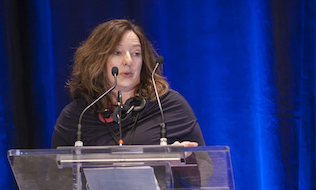
Moderators: Jeremy Evanson, partner, administrative solutions practice; and Michelle Loder, partner, defined contribution solutions, at Morneau Shepell Ltd.
Once the new Canada Pension Plan benefits take hold, the income replacement ratio will increase to 33 per cent from 25 per cent, said Loder. “Given this, and in light of the increased premiums that will also be required from both employers and employees to the CPP, DC plan sponsors should reconsider the design of their programs and the positioning of them in relation to the government programs to best assist their members in making the best-informed decisions about the levels of contributions they make and investment strategies needed to meet their retirement income goals.”
Key takeaways:
❱ With the CPP changes rolling out in phases until 2025, the defined contribution industry has time to think about what the implications will be for different segments of the workforce.
❱ Communications to plan members should focus on setting a goal for retirement income and helping employees understand what they can expect from government benefits and how those programs may affect the contribution levels and investments they choose.
❱ The pension industry needs to discuss what retirement plans are aiming to deliver and the considerations for positioning them in relation to government programs.
Read more stories from the DC Plan Summit
